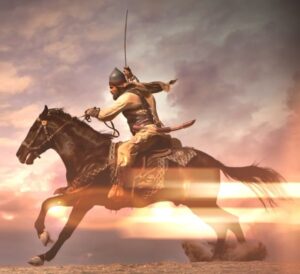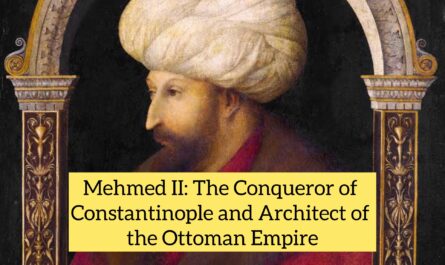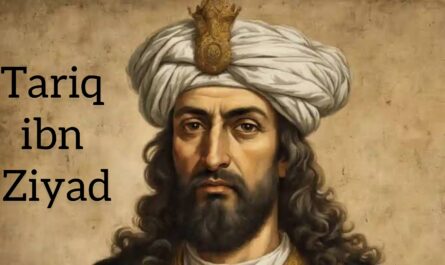Introduction
Khalid ibn al-Walid (592–642 CE), also known as “Sayf Allah al-Maslul” (The Drawn Sword of God), was one of the most brilliant military commanders in history. His tactical genius, unwavering courage, and key role in the early Islamic conquests earned him an immortal legacy in both Islamic tradition and global military history. A companion of the Prophet Muhammad (PBUH), Khalid played a crucial role in expanding the Islamic Caliphate across Arabia, the Byzantine Empire, and the Sassanian Empire.
Early Life and Conversion to Islam
Khalid was born in 592 CE into the powerful Banu Makhzum clan of the Quraysh tribe in Mecca, renowned for producing warriors and military leaders. Initially a fierce opponent of Islam, he fought against the Muslims in several early battles, including the Battle of Uhud, where his tactical maneuvering contributed to a Muslim setback.
However, Khalid’s intellect and introspection led him to reevaluate Islam. In 629 CE, he converted and pledged allegiance to Prophet Muhammad, bringing his military brilliance to the service of Islam. The Prophet welcomed him warmly and gave him the title “Sword of Allah”—a name that would come to symbolize his legacy.

Military Career and Achievements
Khalid’s military career is marked by a series of decisive and strategically complex battles that reshaped the Middle East.
1. Battle of Mu’tah (629 CE)
This was Khalid’s first major battle after embracing Islam. Outnumbered nearly 10:1 against the Byzantine army, he managed to lead the Muslim forces to a strategic retreat, preventing a complete rout. It earned him his famous title from the Prophet.
2. Conquest of Mecca (630 CE)
Khalid led one of the wings of the Muslim army during the bloodless conquest of Mecca. His presence and discipline helped ensure the transition occurred without major conflict.
3. Ridda Wars (632–633 CE)
After Prophet Muhammad’s death, many Arabian tribes rebelled. Under Caliph Abu Bakr, Khalid crushed the rebellions and unified Arabia once again under Islam. His success in the Battle of Yamama, against the false prophet Musaylimah, was pivotal.
4. Campaigns Against the Persian and Byzantine Empires
Khalid then led military campaigns into the heart of the two great superpowers of the time:
-
Persian Empire (Iraq Campaign): He led rapid conquests in Mesopotamia, defeating larger Persian armies in battles like Al-Walid and Ullais.
-
Byzantine Empire (Levant Campaign): His crowning achievement came during the Battle of Yarmouk (636 CE), where his strategic brilliance defeated a much larger Byzantine force. This battle effectively ended Byzantine control over Syria and paved the way for further Islamic expansion.
Military Strategy and Tactics
Khalid was renowned for his innovative battlefield tactics:
-
Lightning-speed mobility: Often used cavalry flanking and rapid maneuvering.
-
Psychological warfare: Used deception and bold strategies to demoralize enemies.
-
Adaptability: Fought in deserts, plains, and hills, mastering each environment.
-
Minimal losses: Many of his victories were achieved with fewer casualties.
His strategies are studied in military academies even today as examples of asymmetrical and mobile warfare.
Demotion and Later Life
Despite his success, Caliph Umar ibn al-Khattab removed Khalid from command in 638 CE—not due to incompetence, but to emphasize that victories came from God, not individuals. Khalid, showing humility and loyalty, obeyed without protest and retired from public life.
He died in 642 CE in Homs (modern-day Syria), reportedly saddened that he died in bed rather than on the battlefield.
Legacy
Khalid ibn al-Walid remains one of the most celebrated generals in history:
-
Never lost a battle in over 100 engagements.
-
Left a legacy of unity, discipline, and strategic brilliance.
-
Remembered with respect by both Muslims and non-Muslims.
- Studied in military academies around the world.
His life is a testament to how brilliance in warfare can coexist with deep spirituality, discipline, and humility.
Quotes About Khalid
“Women will no longer be able to give birth to the likes of Khalid.”
— Caliph Umar ibn al-Khattab“Khalid ibn al-Walid was the embodiment of victory itself.”
— Islamic historian Al-Waqidi



